Everdell Review
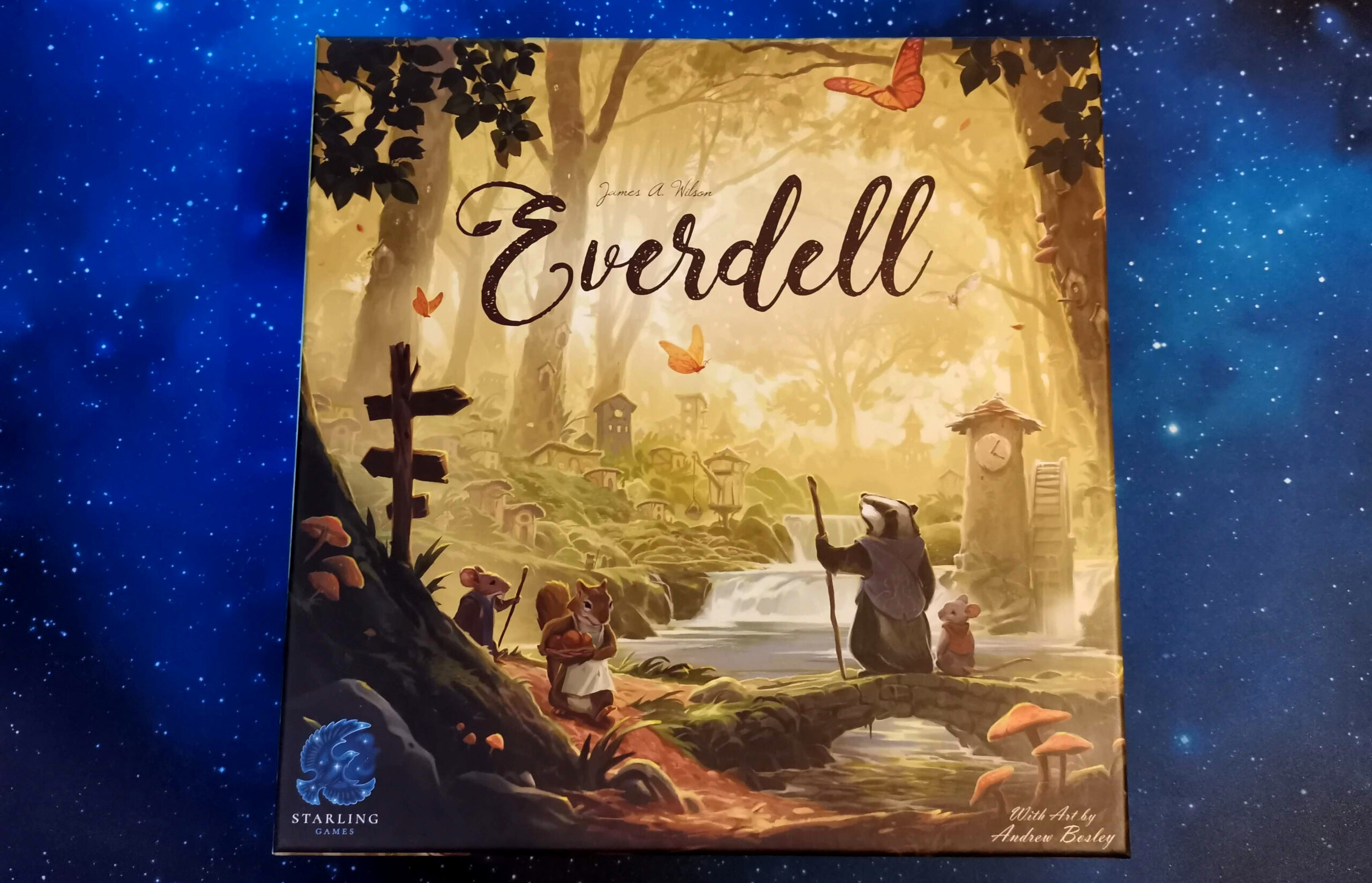
If two of your favourite things are worker placement games, and anthropomorphised woodland creatures, then you’re in for a treat. Everdell from the mind of James A. Wilson and Starling Games is exactly that, so let’s have a look at this beautiful game from 2018 together.
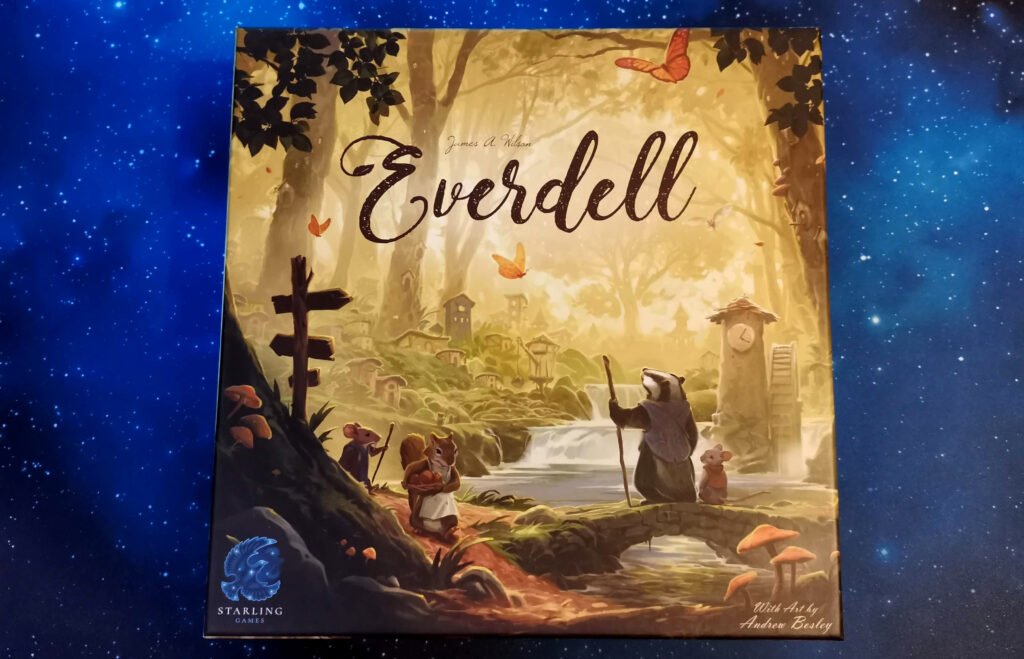
What’s In The Box?
First and foremost in this review, I have to mention the artwork. Everdell is easily the most beautiful game in my collection, and the artist – Andrew Bosley – has created something special. Cute, evocative, and dripping with theme. Even the box itself is a work of art.
Inside the box there’s a decent plastic insert which keeps everything safe. All of the components are absolutely top-notch, the quality hasn’t been skimped on anywhere. The board itself is this curved, artful representation of a meadow, a river, and the woodland around it. The centrepiece though is the so-called Evertree.
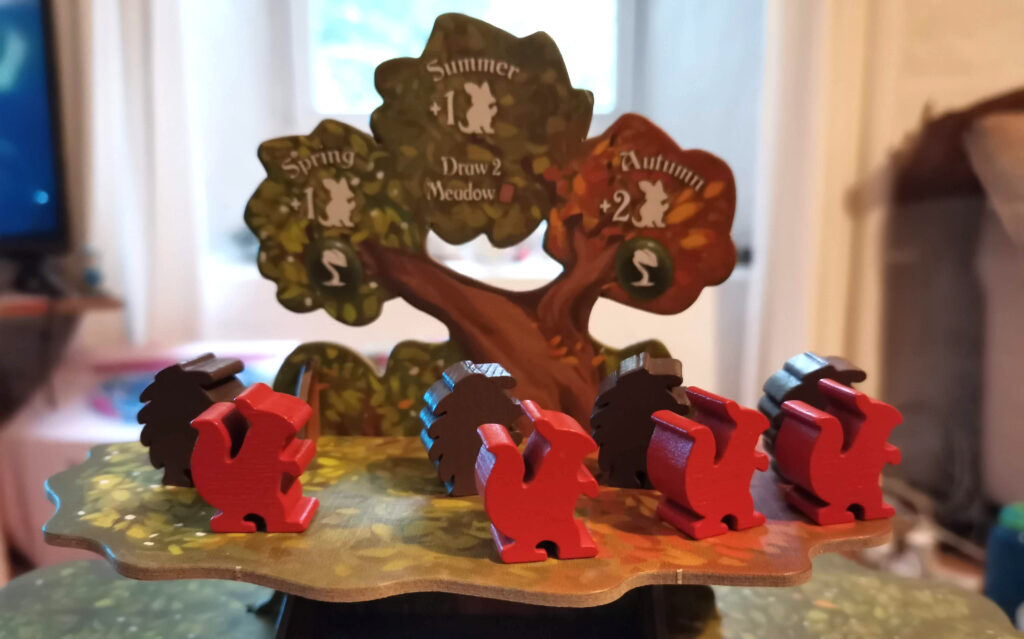
This cardboard structure has to be built before each game and sits proudly at the top of the board. The base of it acts as a store for the multitude of cards in the game, and two layers of branches house special events to be claimed, and as the image above shows, workers to come into play later in the game. It really is a gorgeous thing which will catch the eye of games and non-gamers alike.
The cards have beautiful artwork across the board, and a nice softly textured linen finish. Finally we have the resources, which again feel like they belong in an upgrade kit. Wooden twigs, clear crystal amber, polished pebbles and the unbearably-tactile pink rubber berries. Alongside the cute woodland meeples, it just exudes cuteness and polish.
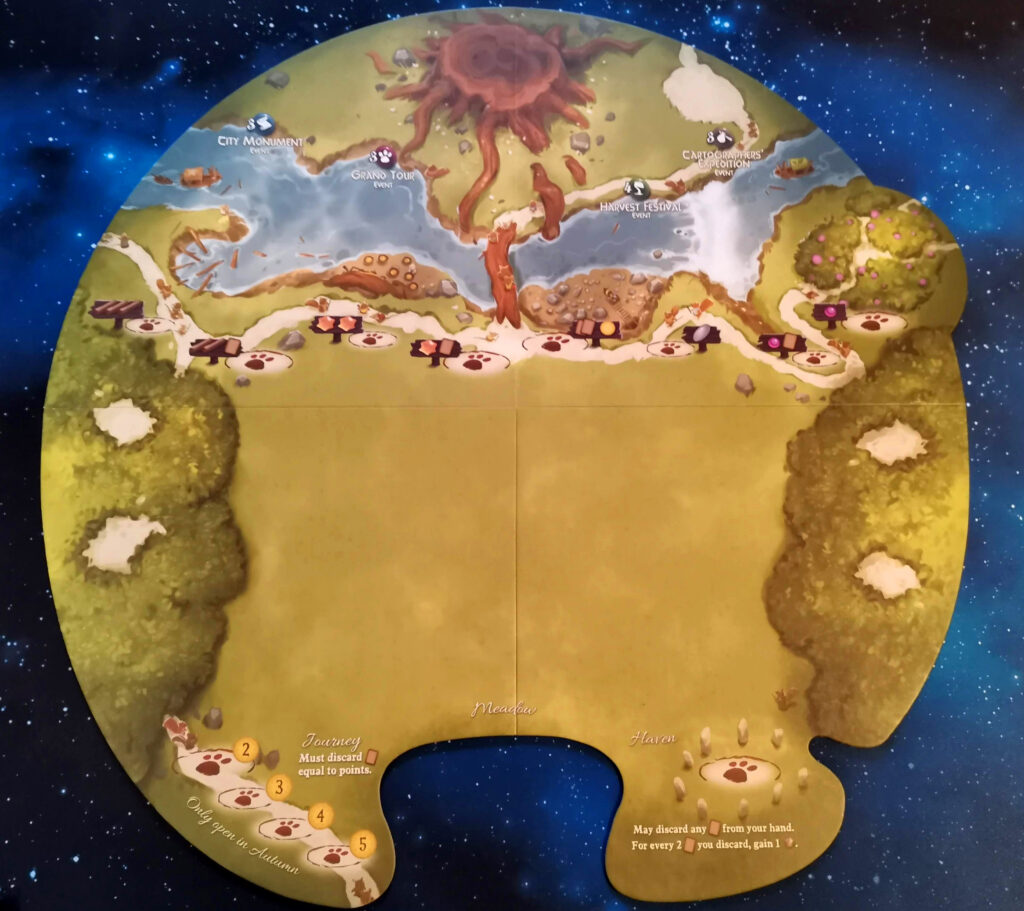
How Does It Play?
Everdell, once all its finery is stripped back, is a card-driven worker placement game. Players place their woodland workers to gather resources, and spend them to ‘build’ cards into their city, which is the tableau they’re creating in front of themselves. The cards represent buildings and critters, the woodland characters who inhabit the game. This city builds victory points, resource production and other ongoing bonuses during the course of play, and at the end of the game, the person with the most points, wins.
Turns
On your turn you can either place one of your workers, or build a card. At the start of the game, all players only have two workers each, so resources are tight. Thematically this fits, the first round represents coming out of winter, so things aren’t exactly in abundance in the forest. Placing a worker usually means occupying one of the spots on the board which grants immediate resources, like three twigs, or two amber and a card, something like that. Later in the game when you have certain cards in your city, there are other bonuses you can claim with your workers.
Cards are built in one of two ways. You can pay the cost shown on the card in resources and play any card from your hand, or the eight-card communal ‘meadow’ in the middle of the board, put it in front f you and take any immediate bonuses it shows. This usually applies to buildings. Critters can be added to your city, and cost a number of berries, or can be added for free if you own the associated building already.
So for example if I have the Post Office in play, and there’s a Postal Pigeon critter in my hand or in the meadow, I can use a one-time bonus to play that card for free. Critters and buildings come in Common and Unique flavours. You may have as many duplicates of common cards as you like, but each unique may only be in your city once.
The Changing Of The Seasons
Once you’ve placed all your workers and built any cards you want to, you prepare for the next season. This entails taking your assigned workers back, and also taking one or more from the top boughs of the Evertree. In Spring or Autumn when you do this, you also activate any cards in your city with the green shoot icon, which basically just runs your tableau again, and can be very powerful if you play cards that work well together.
Along with this there are special events which can be claimed by placing a worker on them, if and when you have enough of the types of cards specified in your city. These are worth VPs at the end of the game. Each time you play, four special events are also placed in the tree, which can give really powerful rewards, if you have the correct combination of cards in play.
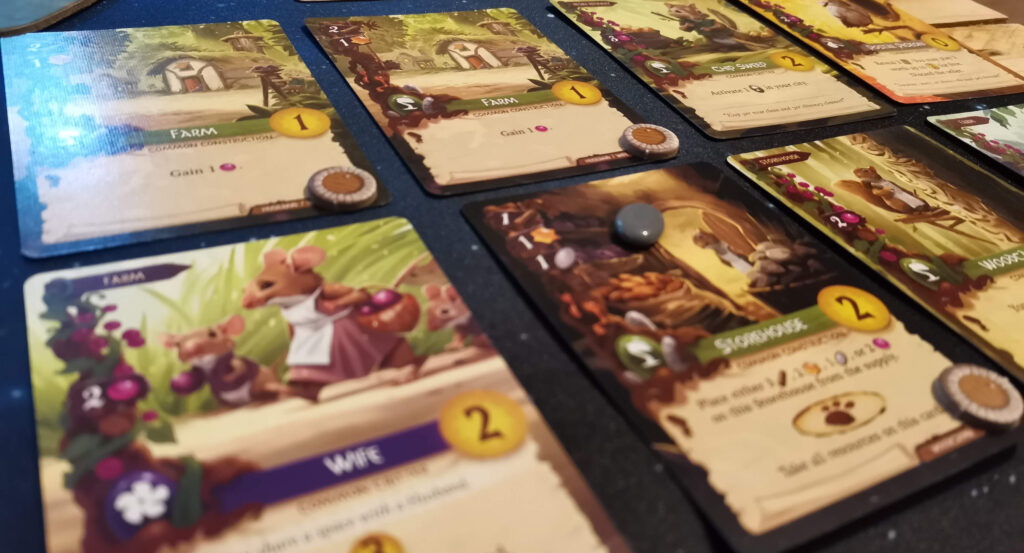
In quite a nice twist for a worker placement game, preparing for the next season can be done asymmetrically. One player could be drawing back his new workers for the Autumn season and running his city for production, while another is still building cards in her city with the resources she already has. If one player finishes before the rest (i.e. places their final worker in autumn), they wait until everyone has finished before calculating final scores.
End Of The Game
Once everyone has placed their final worker, they total up their score. Every card in play has a value, events and special events too, and the purple prosperity cards have a value based on what other card you’ve played at the end. Scoring is really easy to do and there’s very little to have to calculate.
Final Thoughts
I really like Everdell. It’s cutesy exterior belies what’s actually a really clever game, and quite a difficult one. Learning to play it is relatively easy, but learning what works well together takes time. It’s really difficult to talk about the game and not mention how pretty everything is, because it’s so striking. It’s clearly been a real labour of love.
The Evertree is a nice touch, but be warned that the tips of some of the pieces can start to fray and delaminate, as the joins and slots are so tight. It’s easily countered by adding a little PVA or super glue to the tips and letting it dry, but it’s not ideal. My other small gripe is with the special events. These cards are drawn at random at the start of the game and require certain combinations of cards to be in your city before you can claim them. The problem is that there are so many cards (128) that sometimes you never even see one or more of the cards you’d need. This is particularly annoying when playing the solo mode, as the AI player gains points for the special events you don’t complete.
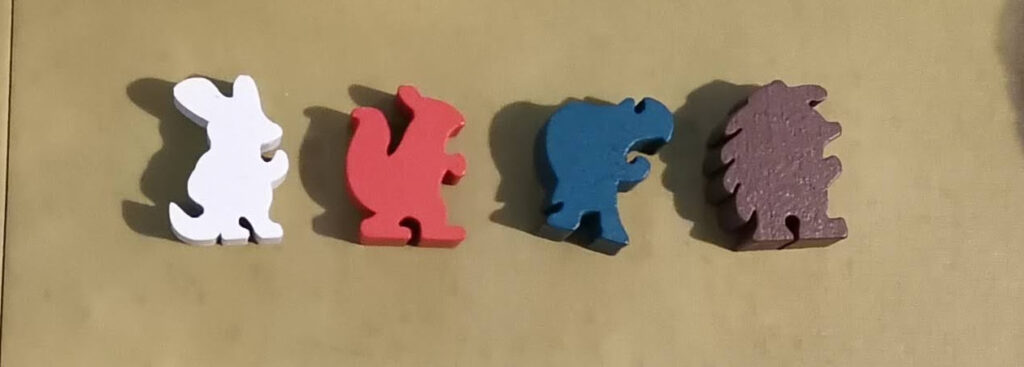
Those are my only gripes though. It’s a charming, well-made game with tons of replay value. The cards can be different every time, the special events and some extra placement spots on the board are placed randomly each time, and there are several expansions to keep things fresh too, each neatly locking in and around the curvy main board.
The first round feels so limiting at first, when you only play two workers, but as the game goes on things seem to open up exponentially. Each time you run your city brings a smile to your face as things work together and heap resources and points on you. It’s easy to forget that despite it looking so sweet, there’s a tight game there.
Solo
As I mentioned above, there’s a full solo mode in the box with Everdell. It’s really nicely presented as you play against an AI character called Rugwort, and he comes with three levels of difficulty. It’s a nice option to have in these times of social distancing, and plays pretty closely to the way you’d play the normal game.
He’s a tough opponent though, so don’t expect an easy ride.
Charm
Honestly, it’s hard not to fall in love with Everdell. It oozes charm and character. If you’re a newbie to more complicated games it’s certainly more friendly than some options, although it is still pretty deep. The theme is what keeps new players at the table long after they might have given up on something with a much drier setting.
Even the rulebook will make you smile. There’s flavour text all through it, and the rules are really nicely written, clear and succinct. There’s even a poem at the start and a full little story at the back of the book, and I love the slightly paradoxical rule of ‘the most humble player goes first’.
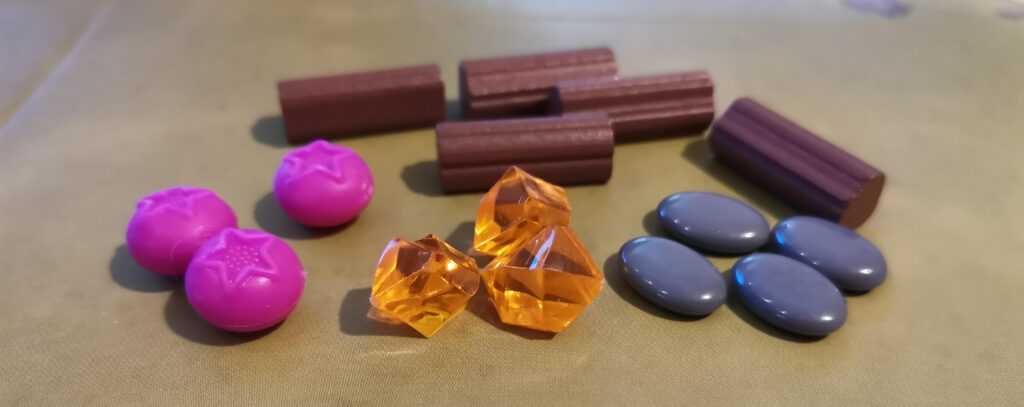
If you like medium weight games and either like, or are curious about worker placement, it’s a no-brainer. It has so much theme and gloss you’d be forgiven for thinking you were taking a lavish Ameritrash game out of the box at first. I’d also recommend it to anyone who has someone they’d like to introduce into the world of ‘proper’ boardgames, but who seem hesitant because of the assumption that it’s going to be dry and flavourless. Everdell is the opposite, it’s a rich, sumptuous, delicious feast for the eyes and the brain, and you won’t regret buying it if it sounds like your kind of thing.







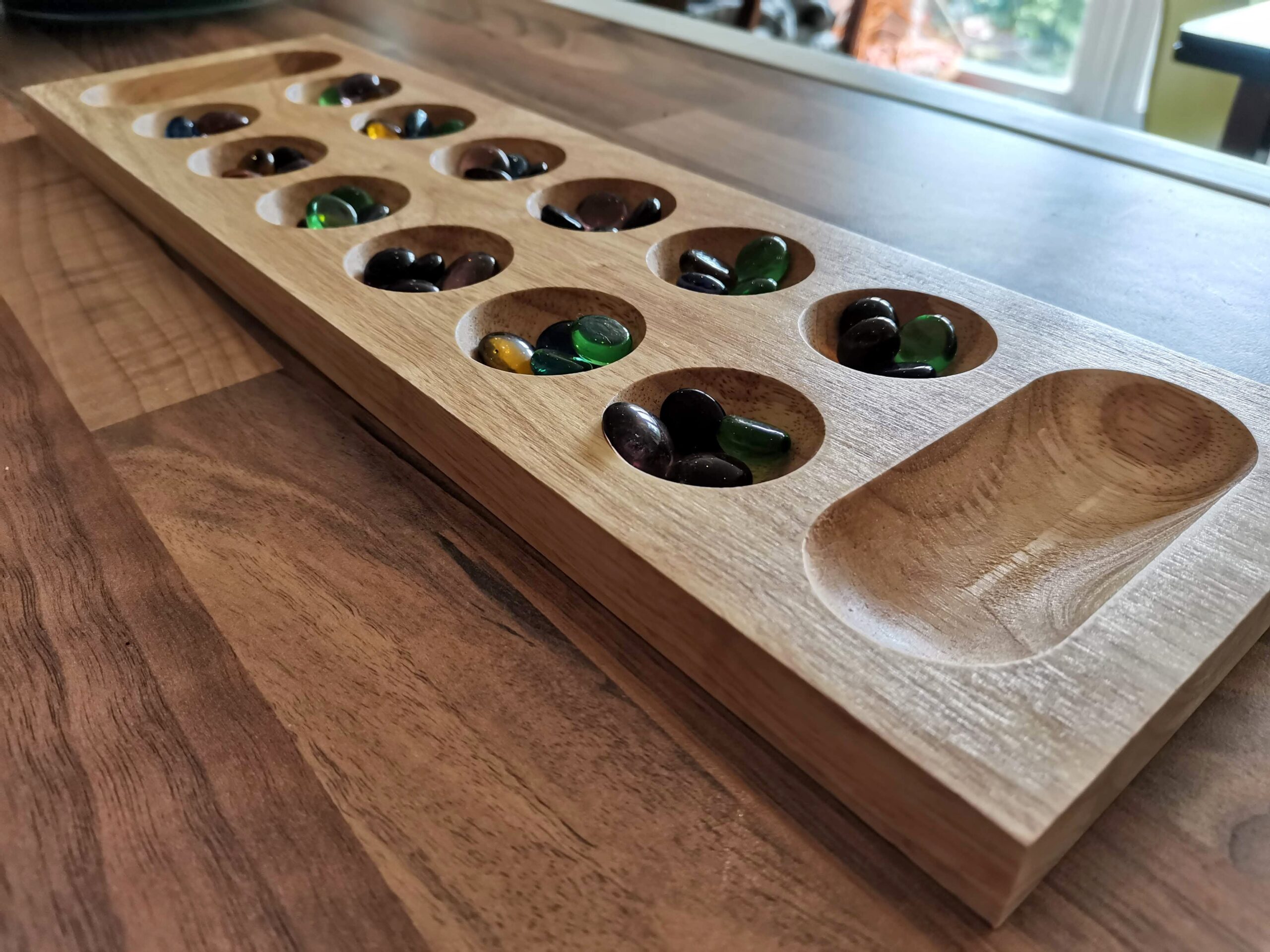




Now I am really hoping that it will be available again soon over here.
It’s a lovely thing, and a proper game too, not just something nice to look at.